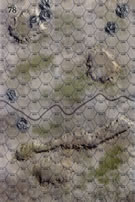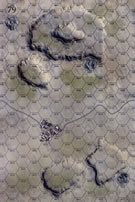- Vulnerable to results on the Assault Combat Chart (7.25, 7.63, ACC), and may be attacked by Anti-Tank fire (11.2, DFT). Anti-Tank fire only affects the individual unit fired upon (7.62, 11.0).
- AFV's are activated by tank leaders (3.2, 3.3, 5.42, 6.8).
They may also be activated as part of an initial activating stack, but if activated in this way would need a tank
leader in order to carry out combat movement.
- AFV's do not block Direct Fire (10.1).
- Full-strength AFV's with "armor efficiency" may make two anti-tank (AT) fire attacks per turn
(either in their action segment or during opportunity fire) if they have AT fire values of 0 or more
(11.2).
- Each unit with an AT fire value of 2 or more may fire at targets at a distance of between 100% and 150% of its
printed AT range. It does so at half its AT fire value. (11.3)
- Efficient and non-efficient AFV's may conduct two opportunity fires per turn if using direct fire
(7.44, 7.64).
Units with both Direct and AT Fire values may use either type of fire in the same turn as their opportunity fire,
but not both (7.22, 13.0).
Units which can take opportunity fire twice per turn do not have to target the same unit both times (13.0).
- Demoralized AFV's are not required to flee from units that do not have AT fire values (14.3).
- Place a Wreck marker when an AFV is eliminated in a bridge or town hex (16.3).
- AFV's do not benefit from Entrenchments (16.42).
- AFV's may Dig In (16.2).
- Open-top AFV's: Immune to M, M1 and M2 results on Direct and Bombardment Fire Tables, but DO take step losses from X and #X results (7.25, 7.41, 7.61, BT, DFT). If a "2X" or "3X" result is rolled, at least one of the step losses must be taken by an open-top AFV if present.
- Closed-top AFV's: Immune to M, M1 and M2 results on Direct and Bombardment Fire Tables. Do not take step losses from Direct or Bombardment Fire. If X or #X result on Fire Table, make M morale check instead (7.25, 7.41, 7.61, BT, DFT).
- Closed-top AFV's: Provide the +1 modifier on the Assault Table when combined with infantry. (Modifier only applies to Germans in all scenarios; Soviet Guards in scenarios taking place after 1942; Polish, US and Commonwealth in scenarios taking place after 1943.) (ACC)
- Tank: all are closed-top and provide the +1 Assault bonus, when applicable
- Self-Propelled Artillery: do not provide the +1 Assault bonus, even if closed-top (SB)
- APC – Armored Personnel Carrier: These are Combat Units, but stack like Transports. They can transport personnel units or towed units. They are not counted as combat units for the +1 stacking modifier on the Direct Fire and Bombardment Tables (4.4). They may be activated by regular leaders and tank leaders (1.2, 3.34, 4.3, 5.43). They do not provide the +1 Assault bonus (ACC).
|




 AAD2015
AAD2015 



























